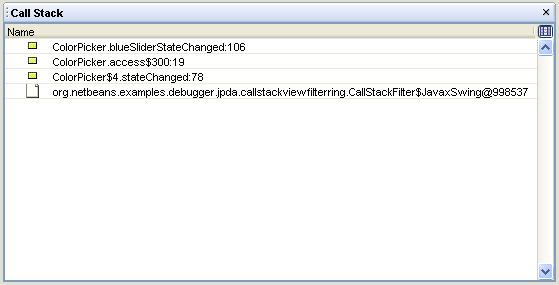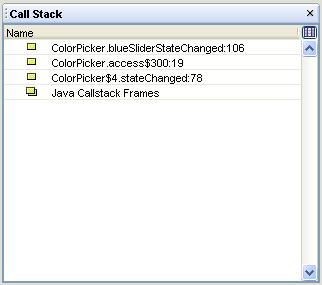-
Interface Summary Interface Description BreakpointStratifier Implement this interface to adjust breakpoint properties of newly created breakpoints according to the strata.EditorContext.BytecodeProvider A provider of method bytecode information.Evaluator<PreprocessedInfo> Evaluator service for a language that compiles into bytecode. -
Class Summary Class Description BreakpointsClassFilter Filter of breakpoint class names.BreakpointsClassFilter.ClassNames The set of class names and excluded class names.EditorContext Defines bridge to editor and src hierarchy.EditorContext.MethodArgument Representation of an argument to a method.EditorContext.Operation The operation definition.EditorContext.Position Representation of a position in a source code.Evaluator.Context Context of the evaluation.Evaluator.Expression<PreprocessedInfo> Representation of an expression that is a subject of evaluation.Evaluator.Result Evaluation result.SmartSteppingCallback Listens on stepping engine and defines classes / places the debugger can stop in.SmartSteppingCallback.StopOrStep Information about a possibility to stop at the given location, or suggestion to perform a step.SourcePathProvider Defines source path for debugger. -
Annotation Types Summary Annotation Type Description BreakpointsClassFilter.Registration Declarative registration of BreakpointsClassFilter implementation.EditorContext.Registration Declarative registration of a EditorContext implementation.Evaluator.Registration Declarative registration of Evaluator implementation.SmartSteppingCallback.Registration Declarative registration of a SmartSteppingCallback implementation.SourcePathProvider.Registration Declarative registration of a SourcePathProvider implementation.
Package org.netbeans.spi.debugger.jpda Description
JPDA Debugger SPIs defines support for Smart Stepping, Variables Filtering
and filtering of all Debugger Views.
Smart Stepping Support
Interfaces involved:
SmartSteppingFilter: Defines list of class exclusion filters to be used to filter stepping in debugged session.SmartSteppingCallback: Listens on stepping engine and defines classes / places the debugger can stop in.JPDAThread: Represents context for SmartSteppingCallback (class name, method name, line number, ...).
Functionality supported:
Set of SmartSteppingCallback installed
to JPDA Debugger defines scope for Step Into / Over / Out Actions. When
user press some Step action, debugging is resumed. And when debugger
stops on some new place (defined by class name and line number) set of
SSListeners is asked if debugging should stop on this place or not (see
JPDA Debugger installs one default SmartSteppingCallback. It excludes all sourceless classes (packages). So, if user does not have mounted sources for Java default libraries, this SSListener adds patterns like: java.*, javax.* and com.sun.*.
SmartSteppingCallback.stopHere(org.netbeans.spi.debugger.ContextProvider, org.netbeans.api.debugger.jpda.JPDAThread, org.netbeans.api.debugger.jpda.SmartSteppingFilter)
method). But this step-by-step method is slow. That is why the second,
more powerfull method is here. SSListener can define some set of class
exclusion patterns (like java.*, com.abba.Loader, ...). This set of
exclusion patterns managed by SmartSteppingFilter class defines scope
for Step Actions in more powerfull way.JPDA Debugger installs one default SmartSteppingCallback. It excludes all sourceless classes (packages). So, if user does not have mounted sources for Java default libraries, this SSListener adds patterns like: java.*, javax.* and com.sun.*.
How to implement some new Smart Stepping Listener:
Lets say we have some xxx module which
generates some code to standard Java classes. The generated code is
always in some methods, which name is prefixed with "xxx" like:
class MyClass {
private void xxxBigBusinessMethod () {
// generated code is here!
}
public void userMethod () {
// user code is here...
}
}
And we would like to change standard
JPDA debugger to not stop in generated methods.
In this case we should implement
In this case we should implement
SmartSteppingCallback:public class SmartSteppingCallbackImpl extends SmartSteppingCallback {
public void initFilter (SmartSteppingFilter f) {}
public boolean stopHere (ContextProvider lookupProvider, JPDAThread thread, SmartSteppingFilter f) {
String methodName = thread.getMethodName ();
return !methodName.startsWith ("xxx"); // if method starts with "xxx" DO NOT stop there!
}
}
To register this implementation, add following annotation before the class declaration:
@SmartSteppingCallback.Registration(path="netbeans-JPDASession")Or register the full implementation class name (packagename.SmartSteppingCallbackImpl) into the file named:
META-INF\debugger\netbeans-JPDASession\org.netbeans.spi.debugger.jpda.SmartSteppingCallback
Variables Filtering Support
Filtering of Debugger Views
Content of all Debugger Views (like
Breakpoints View, Threads View, ...) can be changed by
viewmodel.*Filters. Folowing example shows how to filter Callstack
View. We would hide all frames associated with some "java.*" packages.
Some dummy node will be displayed in the place of this frames.
Step 1.
We should implement

org.netbeans.spi.viewmodel.TreeModelFilter first:public class CallStackFilter implements TreeModelFilter {
public Object[] getChildren (TreeModel original, Object parent, int from, int to) {
Object[] originalCh = original.getChildren (parent, from, to);
int i, k = originalCh.length;
ArrayList newCh = new ArrayList ();
boolean in = false;
for (i = 0; i < k; i++) {
if (! (originalCh [i] instanceof CallStackFrame)) {
newCh.add (originalCh [i]);
continue;
}
CallStackFrame f = (CallStackFrame) originalCh [i];
String className = f.getClassName ();
if (className.startsWith ("java")) {
if (!in) {
newCh.add (new JavaxSwing ());
in = true;
}
} else {
in = false;
newCh.add (f);
}
}
return newCh.toArray ();
}
public Object getRoot (TreeModel original) {
return original.getRoot ();
}
public boolean isLeaf (TreeModel original, Object node)
throws UnknownTypeException {
if (node instanceof JavaxSwing) return true;
return original.isLeaf (node);
}
private static class JavaFrames {}
}
And register it in file:Meta-inf\debugger\netbeans-JPDASession\CallStackView\org.netbeans.spi.viewmodel.TreeModelFilterAs you can see on the picture this Filter replaces some original frames by some dummy node.
Step 2.
We should provide NodeModel (at least)
for our new node type (JavaFrames) now.

public class CallStackFilter implements NodeModel {
public String getDisplayName (Object node) throws UnknownTypeException {
if (node instanceof JavaFrames)
return "Java Callstack Frames";
throw new UnknownTypeException (node);
}
public String getIconBase (Object node) throws UnknownTypeException {
if (node instanceof JavaFrames)
return "org/netbeans/examples/debugger/jpda/callstackviewfilterring/NonCurrentFrame";
throw new UnknownTypeException (node);
}
public String getShortDescription (Object node) throws UnknownTypeException {
if (node instanceof JavaFrames)
return "Unimportant hidden callstack frames";
throw new UnknownTypeException (node);
}
}
And registration:Meta-inf\debugger\netbeans-JPDASession\CallStackView\org.netbeans.spi.viewmodel.TreeModelFilter